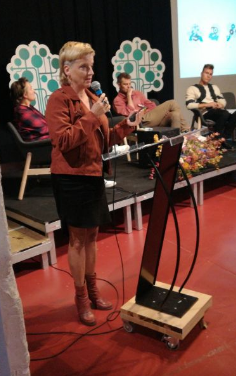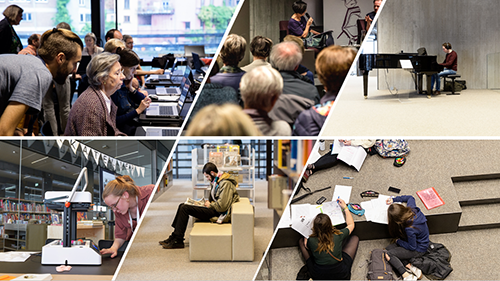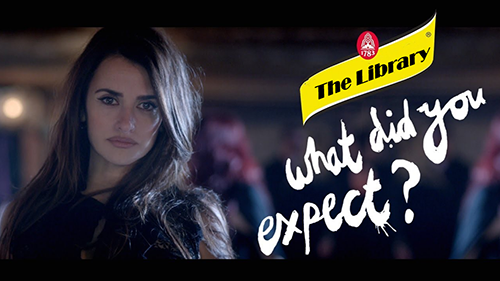A library is a place to read, learn and live
On 10 October 2023 the Belgian EPALE team organized a live event about innovative learning spaces. The 3 Belgian EPALE Support Services joined forces, in cooperation with the national coordinator for the European Agenda for Adult Education in Flanders, to organize this event.
The event took place in the heart of Brussels, La Vallée. More than 100 participants got input throughout the day about skills for the future and more specifically about third places that turn out to be innovative learning spaces.
Innovative learning spaces.... Third places?... The EPALE team and speakers shed light on so-called third places which are emerging more and more in Europe. For some of us, it doesn’t mean much, but we’re surrounded by them all over our cities and rural areas.
These third places, often citizen-managed, based on the principle of collective intelligence, co-creation and creativity with a social economy flavour, bring together people driven by shared ideals: solidarity, progress and innovation. Together, they are looking for solutions to the problems that our society has to face: the ecological and digital ‘twin’ transition, inclusion, sustainable food supply, territorial resilience, and so on.
One of the speakers was Maike Somers from library, or better 'third place' De Krook in Gent.
“Libraries are not only places where you have to be quiet anymore. Libraries are places to read, learn and live”, said Maike Somers. In Dutch this gives a wonderful alliteration: ‘een plaats om te lezen, leren en leven’. “Read, learn live: these are the three pillars that truly flourish through cross-pollination. That’s why we encourage interactions in all directions. From reading to learning, learning to living and back.”
Maike Somers: A library is all about empowerment, emancipation, personal development. About people, a community, even a society… A library is a place where you should be able to grow, to look at things differently, to take things a step further. In fact that’s the reason why libraries were invented. Our most important resource or commodity we use to achieve this is our collection. A collection full of imagination and wisdom of others. With our collection we provide context, meaning, different perspectives or amazement. In doing so, we are making a shift from a collector of books to a broker of stories and knowledge. We help visitors find exactly what they are looking for. Or maybe even what they are not looking for… It could be something from our collection, but also maybe from our activities or services. We want to guide people critically and inspire them with unexpected perspectives so they can leave richer than when they arrived.

Maike Somers at the Belgian EPALE event in LaVallée on 10 October
A library should be a safe haven, create perspective, togetherness, inspiration.
Maike Somers: We try to build a collection that meets the needs of everyone who comes to us. We organize activities to add an extra dimension to the collection. And where possible we make life a bit easier with services like Digipoint, a place where people can learn basic digital skills. But also with a makerspace where people - young and old - have access to technology, such as 3D-printers, laser cutters… We offer digital newspapers, study- and workspaces, lifelong learning advice, … A lot of services we provide have to do with some kind of learning. Sometimes intentionally, most of the time not even.
At the same time, we are searching or experimenting with different ways of facilitating a learning process. One example is the citizen participation project COMON. Another one is our Language Zone to support people learning Dutch. Although the goal was very different, we used the same methodology, based on the principles of human centered design. A human centered design process puts people central in the whole process. It starts with an analysis of the needs and expectations of library visitors, citizens or a specific target group. They are engaged throughout the whole process.
COMON is a collective, created by the library, the University of Ghent and iMec (a research group specialised in and an international key player in nanotechnology). Our goal is to make Ghent an even better city, with solutions supported by technology. In COMON people are involved in developing technological solutions for urban problems. The particpants choose the theme, help shape possible developments and test new technology.
We currently focus on ‘Citizens of Ghent on the move’ which is our second project. Our first project was about understandable health care. We organised activities, debates, philosophy cafés, reading lists and clubs, human libraries, … this to provide context and to stimulate critical thinking about the theme. People who were involved collaborated with experts, non-native speakers, pain patients, short- and long educated people. They tested new technology, etcetera. This is one way how we, as a library, try to contribute to enhance digital literacy.
Participants develop a prototype, have to find partners who want to invest (time), gather feedback, develop a business plan, etcetera.
We also want to be a home of knowledge, language and stories, with a wide range for everyone and special attention to some, for example non-native speakers. Because we want to share knowledge, language and stories with everyone. While Dutch may be the language that binds us, the path to it may go through other languages. It’s our way of helping people connect with each other and better understand the world.
Ghent is a super divers city, with over 165 nationalities. One third of the youngsters don’t speak Dutch as a mother tongue. Multilingualism is a reality. We wanted to redesign our services and offers for non-native speakers, with a focus on the strength of multilingualism, not on the problem of not speaking Dutch. So we decided to make a learning process of it, based on the principles of human centered design. Just as we did with COMON, but with another aim.

4 C’s of 21st century learning
In our process we took the 4 C of 21st century learning into account. These are Collaboration, Critical thinking, Creativity, Communication. Collaboration is working together to achieve a common goal, experiencing that others don’t always have the same opinion. Critical thinking: ask for feedback, ideas, what people miss in the library, how we can do better. Creativity: use our imagination to reflect on the library, ideation, draw, build… Communication: to pitch an idea, to cope in Dutch or another language. We co-designed our services and offers together with non-native speakers. We did this in collaboration with our structural socio-cultural partner Avansa, and Amal, an integration and inclusion agency.
To understand the needs and expectations, we first had very intensive interviews with non-native speakers, teachers, experts. We observed together with non-native speakers, we brainstormed and tried to find possible solutions. Our participants learned to pitch an idea, spoke in Dutch or another language. They co-created with other non-native speakers, learned how to give feedback on ideas. They talked and listened to each other, had to speak Dutch, or ask questions for more information.
Most importantly: they had impact. One of the things we did was based on their feedback and insights: we re-arranged our first floor drastically, introduced new ways of supporting learning in the library, to support empowerment of people, 21st century skills.
Investment, engagement, expectations
A library can’t do this on its own. It takes more time to work together. “If you want to go fast, go alone, if want to go further, go together.” Such a process asks for true engagement: you have to take another role to make sure people to stay involved, and this not only for the participants, but also for our employees. It’s also very important to document the organisational learning process. Not only the learning process of the participants, also that of our own learning process as an organisation.
Safe space
As stated in ‘Sense of Belonging: 39 initiatives that foster European libraries as democratic spaces': ’A library is a safe space where people can come together and build understanding, leading to a stronger sense of solidarity. What better place to do this than a library? As trusted democratic spaces with more than 100 million visitors per year in Europe alone, libraries provide deep-rooted connections to communities, municipalities and local governments. Libraries offer safe spaces for people across Europe to come together with their neighbours and fellow citizens to identify common problems/challenges and find solutions. Libraries have always been a gateway to a bigger world - a gateway to knowledge, to empowerment and learning. Traditionally this was done by books. Now we need to look at what communities want and need. We need to start by looking at how people actually want to engage and interact in society and see how we - as a library- can motivate and stimulate this.'
Sense of belonging
A library is a place where you can step outside the echo chambers of social media. Where you are introduced to materials and content that you would not have come across on your own. A library has to stimulate reflection, learning, the acquisition of knowledge and critical thinking. A library is one of the last places where there are no expectations, where you aren’t forced to do anything, even not learning. It’s a place where you can just be, 'a humane space in an age of artificial intelligence' (dixit André Wilkens, director of European Cultural Foundation in 'Sense of Belonging').
So the library as a third place or a learning hub… what did you expect?

Have a look at the after-movie of this event:
Discover more about innovative learning spaces and third places in this EPALE magazine:






